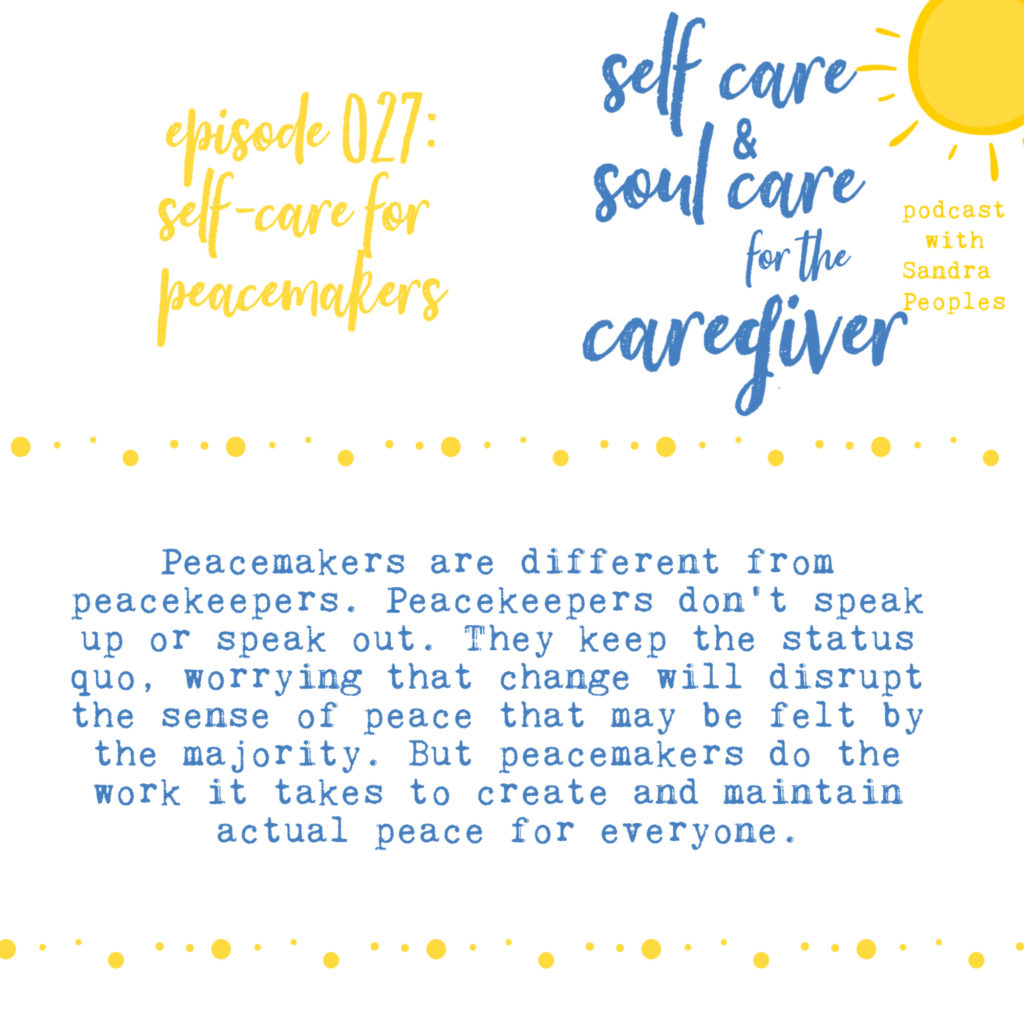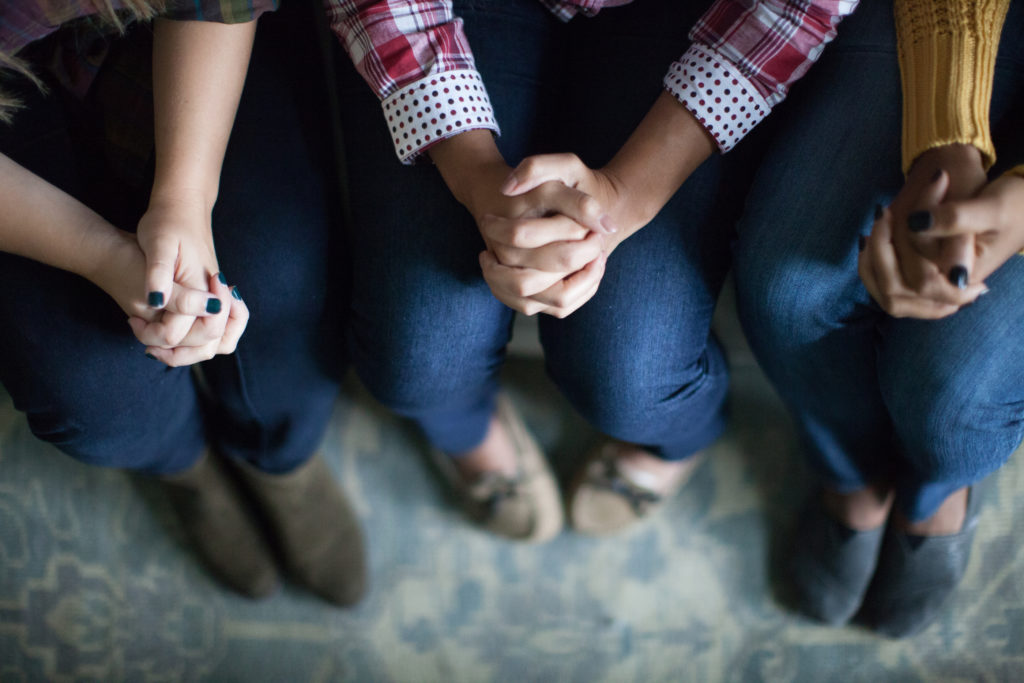Today we’re going to talk about self-care for peacemakers. Peacemaking is different from peace keeping, and it takes more mental and emotional energy. I want to make it clear my advice will be most helpful to people like me—those who may be stepping into this space for the first time. We’re speaking up and showing up in new ways and that is likely leading to more tension in your relationships with family and friends than you’re used to. So let’s talk about how to care for ourselves during this time so we can be strong advocates for the long road ahead and not burnout when the hashtags change.

Quick Links:
Books that increase empathy and compassion (both fiction and nonfiction, affiliate links included):
- United: Captured by God’s Vision for Diversity by Trillia Newbell
- Be the Bridge: Pursuing God’s Heart for Racial Reconciliation by Latasha Morrison
- Just Mercy by Bryan Stevenson
- The Sun Does Shine: How I Found Life and Freedom on Death Row by Anthony Ray Hinton
- The Water Dancer by Ta-Nehisi Coates
- Little Fires Everywhere by Celeste Ng
- Hotel at the Corner of Bitter and Sweet by Jamie Ford
- Dreamland Burning by Jennifer Latham
- The Underground Railroad by Colson Whitehead
- The Sun Is Also a Star by Nicola Yoon
- The Hate U Give by Angie Thomas
- On the Come Up by Angie Thomas
This week’s sponsor, Rising Above’s By the Brook Conference
Transcript:
Episode 27 – Self-Care for Peacemakers
Hi, friends! This is self-care and soul care for the caregiver, and I’m your host, Sandra Peoples. To us, self-care isn’t a luxury, it’s a necessity. We want to take better care of ourselves so we’re able to care for our loved ones who rely on us. That’s why we abide in Christ as we live out our mission.
Today we’re going to talk about self-care for peacemakers. Peacemaking is different from peace keeping, and it takes more mental and emotional energy. After the death of George Floyd, the US is acknowledging racism and racial disparity in new ways. It’s healthy, and it’s hard. Because I’m a white woman with a white husband and white kids, I want to make it clear my advice will be most helpful to people like me. I don’t fully understand the pain African Americans are experiencing right now. The self-care they need has to take into account the trauma they have experienced personally and as a family, church, community, and race. My encouragement today is for those of us who may be stepping into this space for the first time. We’re speaking up and showing up in new ways for us. You may be feeling more tension in your relationships with family and friends than you’re used to. Today let’s talk about how to care for ourselves during this time so we can be strong advocates for the long road ahead and not burnout when the hashtags change.
Scripture talks often about peace. First, we are to have peace with God through Christ and the forgiveness of our sins. Then we are to be at peace with others through our unity in Him. Paul wrote, “And let the peace of Christ rule in your hearts, to which indeed you were called in one body” (Col. 3:5). The peace of Christ in us leads to spreading the peace of Christ through us. He knew we wouldn’t always have peace on earth because of the control sin has over so many. He said in John 16:33, “I have said these things to you, that in me you may have peace. In the world you will have tribulation. But take heart; I have overcome the world.” Because He overcame the friction, distrust, and disunity in the world, He is our example to do the same.
But there have been many times in history that one group’s peace came at the expense of another group. In our country right now, we don’t want peace for only one race or people living in certain neighborhoods. At these times we need to do the hard work of peacemaking and not just peace keeping.
I am the middle child of a middle child. We like things to be peaceful. But making peace means working through hard stuff. In the Beatitudes listed in Matthew, Jesus preached, “Blessed are the peacemakers, for they shall be called sons of God” (5:9). Peacemakers are different from peacekeepers. Peacekeepers don’t speak up or speak out. They keep the status quo, worrying that change will disrupt the sense of peace that may be felt by the majority. But peacemakers do the work it takes to create and maintain actual peace for everyone.

I remember the first time I had to decide between being a peacekeeper and a peacemaker. I was on the playground and heard friends making fun of people with disabilities, even using the r word. Would I keep the peace and stay quiet? Or would I make peace by speaking up in defense of my sister and others like her? I spoke up. And even though it was uncomfortable in the moment, I was more at peace with myself and the decision I made.
A couple months ago in a conversation with the therapist I’m seeing right now I talked about what feels like a lifetime of advocacy for people with disabilities, first as a sister and now as a mom. I didn’t sign up for this role. I was born into it. And I told her I was tired of teaching people how to treat my sister Syble, my son James, and even myself. It felt like I’m constantly saying, “Here’s the language you use and don’t use. Here’s how you make them more comfortable and feel accepted. Here’s what adjustments need to be made.” With friends, with extended family members, at school, at church, out in public places … the opportunities for teaching never end. It’s the hard work of peacemaking so Syble, James, and others with disabilities can have peace.
I’m sure as a caregiver you have your own experiences of peacemaking. There have been times you have stood up to others as you defended your loved one or spoke up for their rights. Even if you were reluctant to do so, you were still brave and did it anyway because it was the right thing to do. But if you’re like me, you may feel a little overwhelmed when stepping into new areas of advocacy. If you have let things slide in the past, it will feel harder to not let them slide anymore. If you’ve been quiet in the past, it will feel like a big deal to speak up now. But remember when we talked about resiliency being a muscle we work out? You get more and more resilient each time you push through and do something hard. Your advocacy works in the same way. The more you use it, the easier it becomes. Just like people know not to use the r word around you, they will learn that you won’t tolerate other hurtful or racist language either.
So as we learn to strengthen our peacemaking skills, here are some ways to care for ourselves as we step into new advocacy roles or become more outspoken as advocates: I have six steps to share with you.
First, amplifying own voices – as an advocate I remember that I’m helping to put others ahead of myself. And to do this well, I need to listen to those I am advocating for and value their experiences and opinions. What I have to say about racism isn’t as important as what someone who has experienced racism has to say. What I have to say about ableism isn’t as important as what someone who has experienced ableism has to say. So my first step in peacemaking is to pay attention to those already doing the work and share the work they are doing.
Second, joining with like-minded peacemakers. Last week I met with my book club friends. I realized one of the reasons I was most looking forward to it is because we’ve all been doing similar work to read about minority experiences and talk about our experiences and prejudices. (In the show notes, I’ll share a list of the books we’ve read and some I plan to read on racism.) I knew we already agreed on so much and we’re working out things with our families in similar ways. I remembered I wasn’t alone. Right now, it’s easier than ever to see what people believe because they are sharing it on social media. I hope you can find friends who doing the same work you are who can encourage and support your journey.
Next, filtering my words through trusted friends. Before I post on social media or take a step of advocacy, I ask those in the group I’m advocating for if it would be helpful or hurtful for them. I’m still learning, and I need guides to help me. That doesn’t mean my friends are responsible for my words or actions or that I need to put that burden on them, but it is important to have a friend who can act as a filter for you. A friend and I texted almost every day last week, asking “Should I say something?” “Who should I contact?” “Does this sound too harsh? Not strong enough?” I hope you have friends who can do this for you as well. If not, now is the time to start developing those relationships.
That leads us to the next important step in self-care for peacemakers, remembering I’m responsible for myself and not others. You can only control yourself. I can’t feel responsible for everything every person I know is saying and sharing. I can speak up when it’s inappropriate, but even when I do, I can’t control what their reaction will be. My husband has been responding to lots of people who are replying with “all lives matter” by reminding them why it’s important to stand with black people right now and not tell them what they can and can’t say or do and not do. It’s actually really hard to see people you care about, people you’re related to, or people you go to church with continue to be racist or downplay the important issues our country is facing right now. We are putting up new boundaries with many of these people and even walking away from relationships. But as we work toward peace, we have to remember we can’t control others and their decisions. We take our steps, they take theirs, and if those steps lead us away from each other, we can mourn that but remember it might be necessary.
Fifth, resting when it feels like too much. Right now, as I’m typing out these words, a neighbor is driving his four-wheeler on the roads, waving a confederate flag as he goes past (illegally I might add, without a helmet or a shirt). I hear him coming before I see him come by the window. It makes me mad, sad, and it makes me tired. After all the positive steps I’m seeing right now—the repentance I’m hearing from people and the acceptance of things they’ve tried to ignore—I still have to see and hear this guy going by. Because we want to be advocates for the long road ahead and not just while it’s kinda popular to do so, we need to rest at times. Resting reminds us that it isn’t all up to us—that others will keep advocating even when we turn off social media, head home from a prayer vigil, or take a break when we feel like we’ve exhausted all our words. Resting also reminds us of the most important step we can take, which leads us to number 6,
Praying for the ultimate solution. Jesus promises peace—we read His words at the beginning of our time together. We pray fervently for earth to become more like heaven in this way. True peace will come when He comes back to set all the wrong things right again. Until then, we keep praying, keep asking, keep begging for His will to be done: for hearts to soften and repent, for decades of injustices to be overcome, and for the diversity that He created to not only know that everyone matters, but that everyone is worthy to be respected and celebrated. I pray for that to be true as I work toward making it true in my heart, my family, my church, and my community.
Friends, those are six steps of self-care for peacemakers: amplifying own voices, joining with like-minded peacemakers, filtering my words through trusted friends, remembering I’m responsible for myself and not others, resting when it feels like too much, and praying for the ultimate solution. As I said, we want to be peacemakers who keep showing up and speaking out when others aren’t at peace. These steps of self-care will help us do just that. Let’s pray together:
God, first we thank You for our advocate, Jesus. 1 John 2 says He advocates for us when we sin, and Hebrews 12 says He sits at Your right hand as our example as we run our race with endurance. We look to Him as we work toward being peacemakers, not just peacekeepers. He is our perfect example. He reminds us to love others and put them before ourselves. In this very challenging season in our country, we ask for Your will to be done. To bring peace above all, but a peace that every one of us can experience. Use us to bring about that peace in our spheres of influence. And, help us to take the steps we’ve talked about today to care for ourselves so we can live out this mission. In Jesus’s name we pray, amen.
Thanks for listening today. I feel like each week I plan for an episode that’s light and fun, but God brings me back to these harder and heavier topics. I appreciate that you keep listening and doing the work along with me. Remember as you share the show with others, you can use the hashtag abidingcaregiver so we remind ourselves and show others that we aren’t super women called to a task reserved for the special few. We are abiding caregivers who remember we are fully reliant on Christ as we live out our calling.
As we close, let me tell you about this week’s sponsor, Rising Above’s upcoming conference for female caregivers called By the Brook! It’s held each summer in Tennessee, but this year it’s open to all of us because it’s happening virtually on June 26th and 27th. Just register for free by visiting www.risingaboveministries.org/bythebrook I’ll be speaking via video Friday night on a topic I know you’re already passionate about—self-care and soul care! Again, remember to register for free at www.risingaboveministries.org/bythebrook
I’ll meet you back here next week, and until then, know that I’m praying for you!



